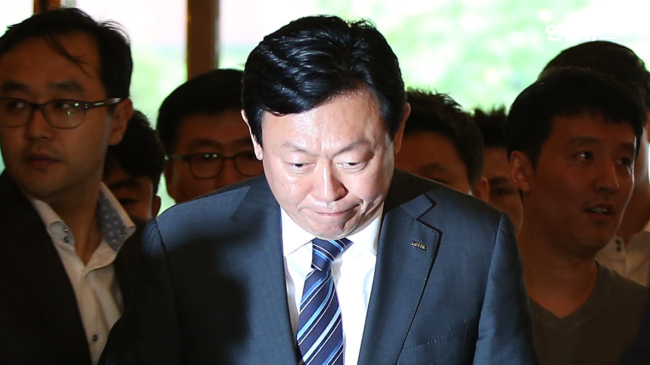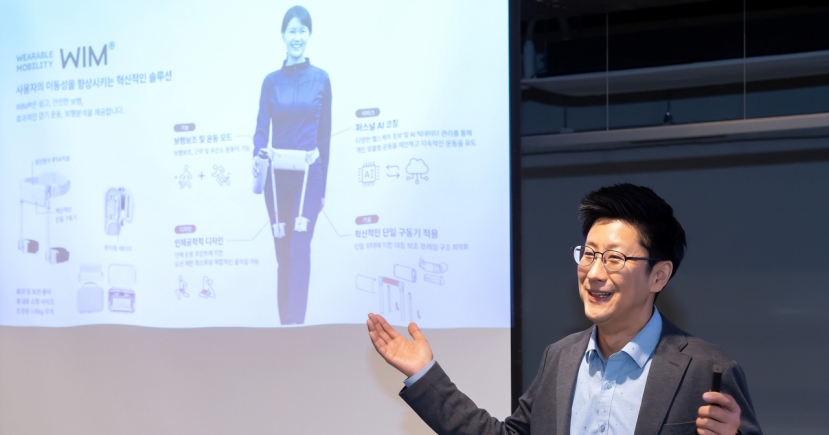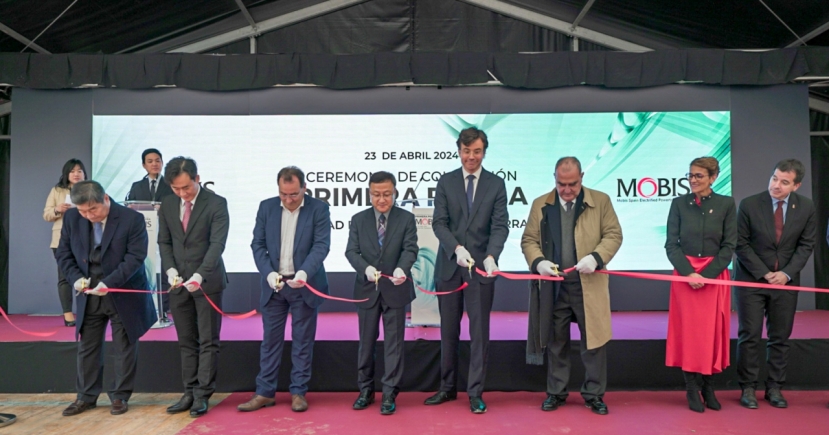The Boardroom
Lotte’s Korean identity struggle takes turn for worse
[THE INVESTOR] Lotte Group Chairman Shin Dong-bin has been striving to keep his Korean identity in check both on an individual and company level, particularly since the 2015 family feud over managerial rights and corruption charges.
Most recently, Shin’s endeavor turned more complicated after his group made the decision to provide its golf course site in Seongju, North Gyeongsang Province, to the Defense Ministry for the stationing of the controversial US Terminal High Altitude Area Defense system, wildly opposed by China.
 |
Lotte Group Chairman Shin Dong-bin (center). |
In response to this decision the Chinese media and government have both been threatening Lotte’s business in the country, although they have denied such ill intentions.
It is difficult to determine whether the decision was a gain or a loss for Shin, at least in terms of economic damage versus illustrating his Korean patriotism.
Shin was born in Tokyo, Feb. 14 1955, as the second son of Lotte Group Founder Shin Kyuk-ho. Having graduated from Aoyama Academy Foundation High School and Aoyama Gakuin University with a major in economics, he completed a master’s degree on finance at Columbia University.
Shin, having been a Japanese national, was confirmed in the past through the words of Lee Kyu-sung, then minister of finance, who said during the National Assembly’s inquiry on the Finance Committee on Nov. 2 1989, “There will be measures taken on Lotte Group Chairman Shin Kyuk-ho in accordance with the law for the illegal endowment of 33,000 stock shares of Fuji Film Korea to his sons of Japanese nationality, Shin Dong-joo and Shin Dong-bin, without approval from the Ministry of Finance.”
According to official gazettes, Chairman Shin Dong-bin lost his Korean nationality soon after he was born in Oct. 29 1955.
The reasons for denationalization was “the inaction of giving up foreign nationality within six months of receiving Korean nationality,” hinting that Shin used to have both Japanese and Korean citizenship for some time after his birth.
Such facts were confirmed 41 years later on June 7, 1996 through the official gazette no. 133330 that was announced by the Minister of Justice. On Aug. 6 of the same year, Shin was given permission to retrieve his Korean nationality.
“General Chairman Shin Kyuk-ho and Chairman Shin Dong-bin were born with Korean nationality, and did not make any attempt to give them up,” said Lotte in September 2015 when the dispute over management took place which involved the eldest son Shin Dong-joo, chairman of SDJ Cooperation.
From this period on, Shin has made great efforts to reinforce Lotte’s image as a Korean firm. He attended the parliamentary inspection of the administration in 2015 where he officially declared himself to be a Korean and that he was hoping to remain so.
There has been efforts made on the company level too, such as by displaying a large national flag of Korea outside the Lotte World Tower in Jamsil as well as banners with patriotic slogans like “Towards reunification, towards the future, Lotte.”
Lotte was accused of violating the Outdoor Advertisement Act that requires such advertisements to be displayed with advanced permission, but prosecutors turned the case down last January, perceiving the campaign as part of the company’s corporate social responsibility projects.
Lotte has also displayed another national flags supported by golden light fixtures last August which the industry took in as something more than a mere advertisement, but that it conveyed a stronger message.
Shin has tried to keep his promise of transferring his revenue to Korean society as well.
Lotte established a committee on public welfare within the group last year in which Shin himself served as the chief. In October, it was said that the number of employees dispatched for CSR tripled.
Lotte also maintained a consistent stance toward the deployment of THAAD saying, “As the request (by the government of the land swap) concerns national security, we, as a Korean firm, will cooperate to the best way we can.” And on Feb. 27, Lotte’s board of directors agreed on the land swap deal that allowed the government to utilize the golf course at Lotte Skyhill in Seongjoo as an area to deploy the US anti-missile system.
However, the decision has made Lotte China’s main retaliatory target, with the Chinese media beginning its attack on the conglomerate. Local news agency Xinhua News Network warned Lotte five days earlier that “it is wrong to base a nation’s security at the cost of threatening another’s.”
The criticism soon became more ferocious. On Feb. 28, China Youth Daily published an article with the title “There is no reason for us to stay still when Lotte is becoming so patriotic.”
Among Lotte’s subsidiaries, Lotte Shopping has reportedly been hit the hardest by China’s Lotte Mart suspension, with over a 10 percent drop in its stock value. There are even predictions that it may have to leave the Chinese market, although the company has been denying such possibilities.
Some observers, meanwhile, suggested that the recent crisis could offer Lotte the option of making a strategic turnaround, citing how Lotte Shopping has been suffering from a continuous deficit in China, by expanding its presence in other markets.
According to a report by SK Securities, Lotte Shopping’s overseas business has a deficit of 200 billion won annually, most of which is suspected to have come from the Chinese market. However, the sales from discount stores in emerging markets, such as Indonesia and Vietnam, have reached 1.4 trillion won, 300 billion won more than that in China.
By The Superich Team (Yoon Hyun-jong, Min Sang-seek, Yim Ji-min)/ (jiminy@heraldcorp.com)








